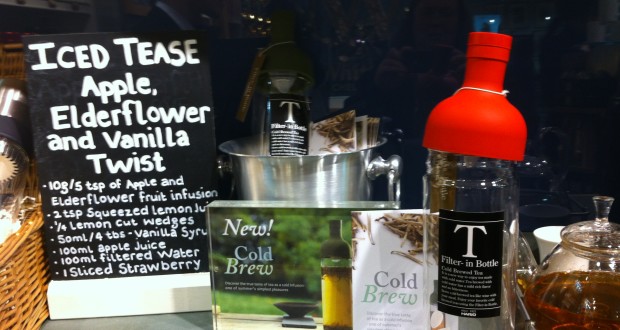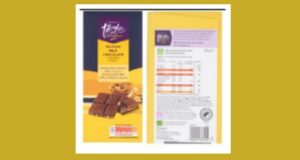Do you remember the days when you went last minute Christmas shopping in Whittard of Chelsea for one of those gift packs which, while suitable for the relative or friend you had forgotten about, was something you fervently hoped you would never receive yourself? Forget them. Whittard is back – a new Whittard packed with goodies you’ll want all for yourself.
It’s all down to Walter Whittard, who opened his first shop in Fleet Street in 1886 to sell tea, coffee and cocoa to the discerning imbiber. It wasn’t just the basics: from day one, Walt was coming up with new blends to suit his customers and showcase the flavours of his produce – a tradition to which Whittard remains true, over 125 years later.
Mr Whittard soon moved his shop to Chelsea, so the brand became known as “Whittard of Chelsea”. It continued as such through the twentieth century and into the twenty-first until it became a victim of the recession. In 2009 Whittard went into receivership, Fortunately, a group came forward to buy the company and nurse it back to health.
For Whittard, the road to recovery has been to embrace the values of the past – the values of putting quality at the top of the company’s agenda. Every day, 80 million cups of tea are drunk in the UK. Of these, only six million are brewed from premium, loose leaf tea – the kind that Whittard supplies so well and conveniently. That is the market which Whittard is targeting to help the company grow and find its way back to full financial health.
The vision of bringing an appreciation of fine teas to a mass market is being ably led by new Whittard CEO Mark Dunhill, whom I met on a drizzly afternoon outside a temporary pop-up in Canary Wharf. Mark is a self-confessed tea aficionado, a man who finds himself drawn to exotic teas in particular. He wants to see the British people reconnect with their heritage: and what better part of London to do this in than Tower Hamlets, with its fusion of native Brit tea drinkers and people of Bangladeshi origin who have been growing the precious bush (and drinking infusions of its leaves) for centuries. Tea is part of our shared heritage in this borough.
Mark Dunhill senses that we’re all a bit bored with supermarket teabags. He’s not on a mission to stamp them out, but he wants us all to discover new aspects of tea – to learn about the differences between different varieties of black tea, to branch out into green and white teas, to explore the blends Whittard is concocting. He wants to show us how to blend our tea with fruit, to drink it cold with ice – to add a splash of alcohol and turn it into a cocktail. He needs us to explore his herbal infusions, products genuinely based on combing quality ingredients (rather than adding a small amount of aromatics to a standard supply of harsh hibiscus and pretending you’ve got a new flavour – my words, not those of the impeccably courteous Mr Dunhill).
Whittard’s quest for quality stretches through the whole range of tea, coffee and cocoa/chocolate products on offer (though Mr Dunhill and I had so much fun discussing tea, we didn’t get on to the other products – another time, perhaps). In this way, Whittard hopes we can go beyond drinking what we can infuse out of a teabag or dilute from instant coffee powder as a background activity and instead learn to enjoy a really tasty beverage. That’s why, as well as concentrating on quality raw consumables, Whittard is trying to provide you with everything you need for the all-round experience.
Mr Dunhill’s research suggests that young people are turning away from standard cocktails and other off the shelf alcoholic tipples when drinking at home or before going out, and they are also turning away from the traditional pub as a place to consume alcohol. He hopes that tea can come back into fashion – to drink alongside a celebration meal, to enjoy with friends as an alternative to going to one of those chains which concentrates on coffee. Again, the multiculturalism of Tower Hamlets makes us a natural target for Whittard. We can have a special beverage at a special event, even if there’s no alcohol involved. Whittard sells a range of chais as well as herbal infusions and a full range of teas of all colours, so there should be something for every gathering. There’s even perfumed teas (hurrah) – though possibly a little too much emphasis on bergamot (boo).
However, it’s not all about the quality: the other thought driving Whittard is that tea is good for us. Herbal and green teas contain welcome anti-oxidants, and even tea with caffeine is not generally thought to be associated with the health risks that caffeinated coffee poses.
Having said which, it has to be said that as well as the basic tea, coffee and cocoa ingredients, Whittard also sells the paraphernalia that you need to make your beverage and enrich your drinking experience. Coffee comes as beans or ground, so Whittard will offer you grinders and a range of coffee making machines. There’s also teapots and strainers and a whole new kind of tea egg. Tea eggs were the first go at tempting us to go back to loose-leaf tea, to put leaves on more of par with the convenient tea(dust)-bag. Sadly, they were fiddly: fiddly to fill, fiddly to swish about in your mug of hot water, fiddly to fish out, fiddly to store when you had fished them out and fiddly to clean.
The Whittard version is a whole new design, like an extended firm teaspoon: easier to fill, a delight to swish with, a synch to retrieve and clean. It’s got a bit of a posh name (“spring action infuser”), but it retails at a down to earth £8 and could be the answer to drinking quality tea for the solitary drinker. Other infusers are available: a floating one on a stand and a heart-shaped one (why? never mind) and actually a few others, which may be too much choice for the terminally indecisive – but jump in and get one and test drive it with some good leaves.
I was treated, during our chat, to a concoction created with a Whittard tea jay. It all happened a bit too fast to follow, but certainly what came out was a heavenly mix of blueberries and strawberries: it’s to the credit of Whittard’s demonstrator that she managed to make something so truly lovely out of ingredients I am not actually very fond of in the normal way of things.
I was Mr Dunhill’s last appointment that day, so I’m fairly sure he’s left Canary Wharf by now – though he’s bound to be back as he spends at least a day a week visiting some of the 52 Whittard stores, most of which are in London. However, the good news is that he has left a Whittard store behind, nestled in the heart of Canary Wharf. It’s staffed by some really, really nice and knowledgeable people, one of whom instructed me in the art of making tea with cold water (pretty much as Paul Hollywood eschews traditional warm water for yeast mixes and opts for the flavour cold water brings). I’m not going to tell you anything about how to do it: get yourself down to Canary Wharf, find the store with the big W on the front and ask them for yourself!
 East London News A Force for the community…
East London News A Force for the community…




